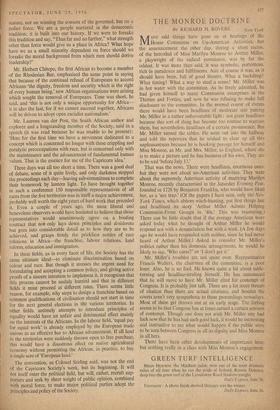THE MONROE DOCTRINE
By RICHARD H. ROVERE New York MANY odd things have gone on at hearings of the House Committee on Un-American Activities, but the announcement the other day, during a short recess. of the betrothal of Miss Marilyn Monroe to Arthur Miller. a playwright of the radical persulasion, was by far the oddest. It was more than odd, it was symbolic, portentous. rich in paradoxes and fulfilments. And of course it was, as it should have been, full of good theatre. What a backdrop! What timing! What a way to steal a scene! Mr. Miller was in hot water with the committee. As he freely admitted, he had given himself to many Communist enterprises in' the Thirties and Forties, and now he was refusing to make full 'disclosure to the committee. In the normal course of events there would have been headlines of moderate size putting Mr. Miller in a rather unfavourable light : not giant headlines because this sort of thing has become too routine to warrant them, but nevertheless headlines of a certain prominence. But Mr. Miller turned the tables. He went out into the hallway and told the reporters that he wished to clear up all this unpleasantness because he is booking passage for himself and Miss Monroe, as Mr. and Mrs. Miller, to England, where she is to make a picture and he has business of his oWn. They are to be wed 'before July 13.'
That was the news. There were headlines, enormous ones. but they were not about un-American activities. They were about the supremely Aniericati activity of marrying Marilyn Monroe. recently characterised in the Saturday Evening Post, founded in 1728 by Benjamin Franklin, who would have liked her, as a 'sex trap.' (Of the papers I have seen, only the New York Times, which abhors witch-hunting, put first things last and headlined its story 'Arthur Miller Admits Helping Communist-Front Groups in '40s.' This was reassuring.) There can be little doubt that if the average American were asked today , what he thought of Arthur Miller he would respond not with a denunciation but with a wink. (A few days ago he would have responded with neither, since he had never heard of Arthur Miller.) Asked to consider Mr. Miller's politics rather than his domestic arrangements. he would be likely to say, 'Who cares?' or 'I don't get it.'
Mr. Miller's troubles are not quite over. Representative Francis Walters, the chairman of the committee, is a poor loser. Also, he is no fool. He knows quite a bit about table- turning and headline-stealing himself. He has announced that he will move to have Mr. Miller cited for contempt of Congress. It is probably just talk. There are a lot more threats of citation than there are actual citations, and besides the courts aren't very sympathetic to these proceedings .nowadays. Most of them get thrown out at an early stage. The feeling seems to be that Congress has at times earned a certain amount of contempt. Though one does not wish Mr. Miller any bad luck now that he has had such good luck, it would be interesting and instructive to see what would happen if the public were to be torn between Congress in all its dignity and Miss Monroe in all hers.
There have been other developments of importance here. but nothing really in a class with Miss Monroe's engagement.


































 Previous page
Previous page